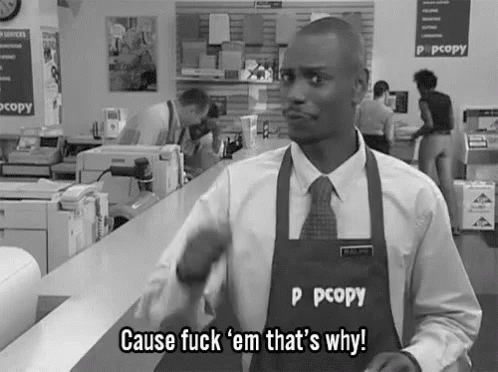One GOP proposal takes aim squarely at parents raising children on their own by eliminating the “head of household” filing status to reap some $200B more in taxes over a decade from single parents and other adults caring for dependents on their own.
So increase prices on the poor and then cut their benefits. Frankly, I’m here for it. Quickest way to turn your blue collar base against you is to make sure that they go hungry. Go on Trump. Give them a reason to write “Let them eat cake” in your blood.
deleted by creator
True, but at least they’ll suffer for it?
At this point, I’ve largely embraced apathy:

Agreed, fuck those dick heads.
I hope their families starve because they’re too uneducated to get a job.
It’s obviously all Obama’s fault!
More likely outcome - they’ll use this to enrage the base, point them at POC, LGBTQ, non-xtians, liberals, etc…and promise them a pardon.
Nah Faux News will instruct them to think it’s Obama’s fault somehow.
You say this like they would turn on him. Don’t underestimate their “I’d eat shit so libs would have to smell my breath” mentality.
This might work if all major news networks and social media weren’t propaganda machines of the maga regime. The administration will blame immigrants or democrats or trans people for every hardship that republican voters experience.
Reminder that taxes do not fund spending. They do not need to “offset” the tax cuts by reducing benefits. They simply want to do both.
So taxes exist just to make money disappear?
According to MMT, they serve to maintain currency demand.
All these elite tax cuts undermine the system described by MMT, however
Taxes primarily exist to create demand for the currency.
Let’s say we’re starting a new club with 100 members. We’ve got 5 big projects for this month, and we want to make sure all the members pitch in.
So we say: a month from now, everyone will turn in 10 “I helped!” stickers. If you don’t, you’re out of the club.
Then we hand out maybe 1500 “I helped!” stickers total to the leaders of the projects, to make sure there’s enough to fill the demand for 1000 stickers since we know some will do more than others and end up with more than 10 stickers.
The leaders delegate the work out to other members, giving them stickers along with their assignments. Some members end up having scheduling conflicts, so they trade assignments between each other along with the corresponding bounty of stickers.
The month ends, everyone turns in their stickers, and we start all over again.
Notice a few things:
- We’re not limited by how many stickers we get back from the members. Say we only get 800 back. We can still issue more than 800 stickers into the pool of members next month if we want to.
- We didn’t have to ask for stickers from the members first before we could spend them out. We spent first, and taxed later.
- We’ve got stickers left over in the economy. So now our new stickers, allocated for next month’s projects, are competing against last month’s sticker-holders. To some extent, this is healthy, because it means people who worked extra hard this month can relax a bit next month. But we don’t want too much to accumulate in the hands of too few people, or else our government spending becomes worthless.
So taxes are important for giving people a reason to contribute and do something for each other, controlling inflation, and making sure wealth stays somewhat evenly distributed. But they’re not a prerequisite for spending.
I think that while the relationship between tax revenue and spend can be fuzzy, there’s only so far you can push printing the “I helped!” stickers without regard for the amount coming in before it all breaks down. Part of the value of those “I helped” stickers is knowing that the authority doesn’t just print up a few quadrillion because they felt like it, and that the volume of incoming and outgoing “stickers” is at least somewhat in the ball park of comparable, and any deviation between the two at least be steady and predictable and thus subject for planning.
Yep. That was point three here:
We’ve got stickers left over in the economy. So now our new stickers, allocated for next month’s projects, are competing against last month’s sticker-holders. To some extent, this is healthy, because it means people who worked extra hard this month can relax a bit next month. But we don’t want too much to accumulate in the hands of too few people, or else our government spending becomes worthless.
Deficits still matter, they just don’t matter in the same way that we usually see in the media when they talk about “revenue” and “spending taxpayer dollars”.
Given that, I think the claim that there is zero need to offset spending would be pushing it too far. It might not be as simple as a naive interpretation and somewhat more flexible, but it still has a rather significant relationship that shouldn’t be neglected.
Just print more money to pay for everything, hur dur, taxes are a scam!
Taxes are massively important. They’re just not the source of the government’s money, which… yeah, is… printed. It even says so on the bills.
Reminder that taxes do not fund spending.
MMT is definitely one theory of federal spending. But it tends to neglect the impact of a growing money supply on a constrained real economy. Right now, we’re doing a kind-of privatized MMT via Saudi investment. What its creating is a lot of dogshit MMA spin-offs and failed desert cities. Also, its creating a hugely inflated share price for Musk properties.
Without anything to offset Saudi spending, we’re watching the global media, resource surplus, and labor force bend towards doing whatever the fuck MBS happens to want to do at a given moment. A proper modernized global taxation system that limits what a single individual can own would have curbed these excesses significantly. What’s more, it would free up resources and labor (and declutter our gish gallop media) for more socially beneficial projects.
Where MMT stumbles is in how it aligns real material limits of the economy with a matching money supply. Just injecting more cash into the system doesn’t produce more labor/materials ex nihilo. It only draws them from the global stockpile. If your public sector is playing tug-of-war with a better-funded private sector, it will appear to cost more and produce less than its privatized peers.
That’s ultimately why you need taxation. Not to fund via cash but to free up surplus goods for public appropriation via shrinking the money supply.
Yeah, MMT is not a prescription for how to behave going forward. It’s just an account of how money has worked so far. We’re seeing international robber barons take shape, and I don’t think there are good historical examples of how that ends up functioning and what our options are for handling it.
I’d argue that MMT not having an answer for relating the “real economy” to a specific monetary policy is actually a good thing, because it keeps it descriptive instead of prescriptive, but you’re right – the obvious next step is “Okay, so, if balancing the budget is not a good metric, then what is?”
Stephanie Kelton’s answer is to look at the state of the real economy and make decisions that way. It’s… a very tall order. There are massive organizations dedicated solely to getting a clear picture of the real economy of a single sector.
You might spot 10 functions that appear under-utilized, so you fund those and expect to see a return, but they’re really constrained by one small thing, and once you fund that thing then those 10 functions roar to life and get into a bidding war and wreck pricing for that little pocket of the economy.
But it’s worth noting that these problems exist right now, we just aren’t paying attention to them because we spend more time trying to chase the dragon of austerity instead of taking a single minute to talk about utilization.
“Okay, so, if balancing the budget is not a good metric, then what is?”
Balancing the budget is a good metric when its rooted in material needs.
There are massive organizations dedicated solely to getting a clear picture of the real economy of a single sector.
When individual sectors are carved up into privately administered and obscured subcomponents, its difficult, true. But when you’ve got a large vertically integrated conglomerate, it is comparatively easy. Walmart, Amazon, and Exxon all managed to organize administration of an end-to-end supply chain where they can claim profit at every step of the economic process.
We’ve seen more transparent and well-integrated economies apply these tools holistically. Allende’s Chile implemented Project Cybersyn with enough early success that the incoming Pinochet government decided to obliterate the system rather than admit it’s effectiveness. Deng’s China and Sankara’s Burkino Faso and Castro’s Cuba all managed to integrate their domestic economies in a central model that boosted productivity and dramatically reduced poverty.
But it’s worth noting that these problems exist right now, we just aren’t paying attention to them because we spend more time trying to chase the dragon of austerity instead of taking a single minute to talk about utilization.
The idea of austerity is always rooted in the theory of private investment as a galvanizing force for growth. But even when your country is relatively small, the investment you can engineer through public sector collaboration regularly outpaces the growth you can obtain from an injection of overseas capital. When your country is large and diverse, public sector programs that integrate regions - most notably the shipping lanes and rail networks and canal projects and data pipelines drastically reduced cost of transit during the last 300 years - promise enormous returns for relatively small investments.
Gotta give credit to modern logistics where it is due. Any austerity program that eats away at our ability to cheaply and easily transfer materials and labor will cost more than it yields in the long run.
Are you by any chance also talking about how dumb Trump voters must be? Yikes.
As is tradition.
But of course.
This is extremely cynical of them.
Cynical? It’s the core plank of the Republiqan platform and always has been.
And now the broligarchs are tired of playing footsies with even pretending to care about stuff on the margins (DEI hiring, rainbow-washing, etc.) they bought donvict and now they are going to cash the fuck in. If they can smash the working class completely, and end democracy entirely, they won’t even have to worry about any more pandering with the usual ragebait they need to get dumb people to vote for Republicans, either.
You hear that, peasants? The pain you are going to feel is going to be a patriotic one, because you’ll be helping to feed into the glorification of the already obscenely wealthy!
Also another big benefit and this is the one you probably are most excited about: this might harm some brown people and some libs, too, so enjoy your SHIT SANDWICH because some of the people you love to hate might have to smell it! Eat up.
Why do we pay taxes anymore? Wasn’t that the whole reason for the tea party, people paid for what, no say or benefit?
We pay taxes for public roads, firefighters, police, military, parks, etc. If they aren’t going to be used as a pool of resources to focus into infrastructure for the country then it’s a crime to pay into thin air that just gives elon even more money.
Removed by mod
That headline is doing a lot of posturing.




